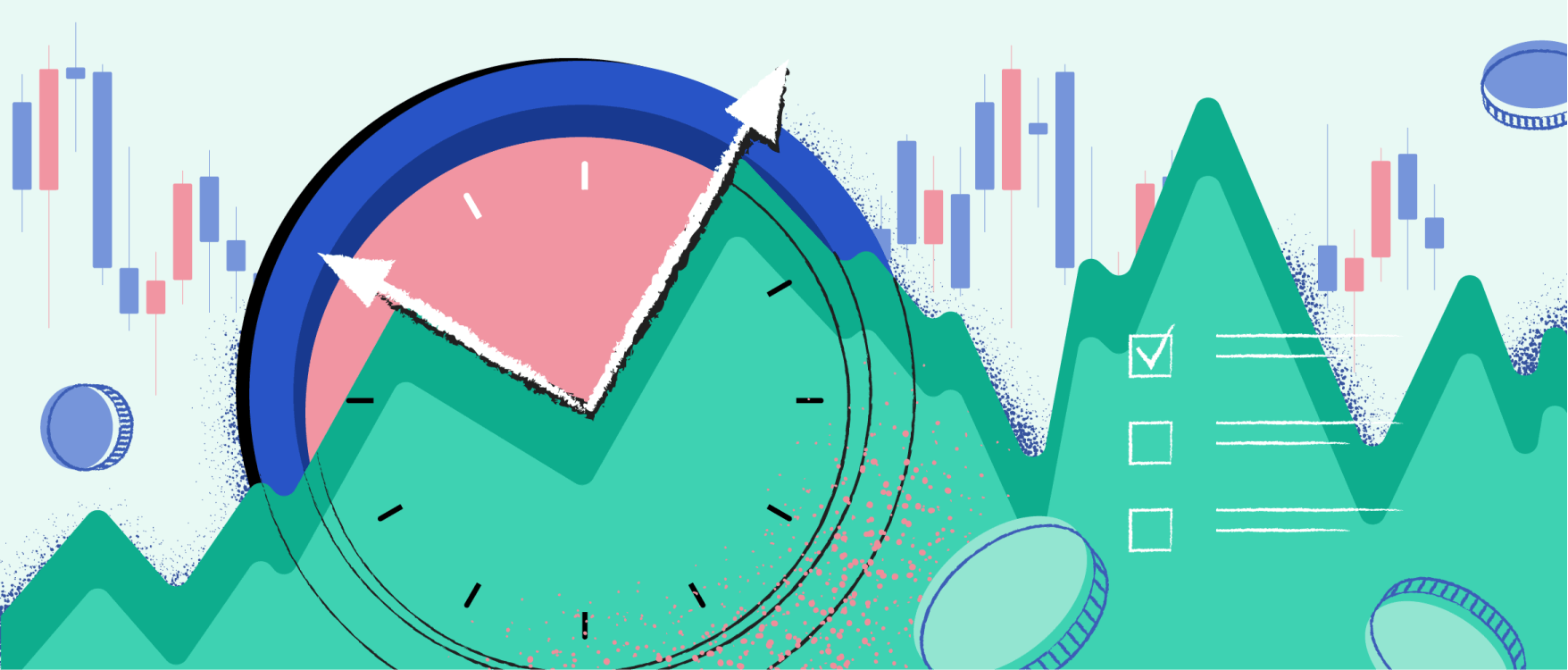
- All
- Analytics
- Technical Analysis
- Trading
- Blockchain
- DeFi
- Guides
- Company News
- Educational
- Opinion
- Price Predictions
- Tools
- Market News
- News
- Trading cases
- Practical guides
- Exchanges
- Trading signals
- Cryptocurrency
- Crypto bots
- Other
Become a crypto master
Learn everything about crypto,
trading and bots

A Beginner's Guide to Day Trading Cryptocurrency in 2025
- What are cryptocurrencies and how do they work in 2024
- Learn day trading for beginners
- Why day trade cryptocurrencies
- Can day trading be profitable?
- The pros and cons of day trading cryptocurrencies
- Day trading terminology explained
- What are some basic day trading strategies?
- How to get started in the crypto market
- Can you day trade Bitcoin?
- Picking an exchange that's right for you
- Conclusion
Start Trading on 3Commas Today
Get full access to all 3Commas trading tools with free trial period

Day trading can seem like an intimidating task for those who are not familiar with the process, especially in the wild world of cryptocurrencies. When learning how to day trade cryptocurrency, it is important for beginners to understand all of the risks and benefits of day trading, and approach it with a solid day trading cryptocurrency strategy.
First and foremost, you’ll need to figure out your day trading strategy. This should include defining your investment goals and determining what time frames work best for you. Once this is done, you will want to open up a brokerage account so that you have access to day-trade cryptocurrencies platforms as well as other types of investments such as mutual funds or bonds.
Next, you’ll want to determine which cryptocurrency day trading exchange is best for your needs. Ideally, it should have low fees and robust security measures in place.
You don't need any special qualifications or certifications before you start making money trading cryptocurrencies - all you really need is some basic knowledge about how markets work and what it takes to trade successfully.
If you are familiar with equities day trading then most of this information will be new in form but not otherwise different, if not better than your current understanding.
In this intro to day trading cryptocurrency, we will discuss some of the terminology and strategies you'll need to know in order to make the most of each and every trade you make!
What are cryptocurrencies and how do they work in 2024
Cryptocurrency is a new kind of currency with many benefits. Transactions are public, safe from fraud and scams, and often cheaper to send compared to traditional banks or payment processors. The cryptocurrency market is exploding with thousands of people adopting this alternative way to pay for goods or services online.
The first cryptocurrency was Bitcoin which arrived on the scene in 2009 as an open-source software project from someone using the pseudonym Satoshi Nakamoto. The introduction of this new form of sound money has since changed the investment landscape forever, sparking the rise of an entire multi-trillion-dollar industry in the following.
Cryptocurrency works very similarly to the U.S. dollar, in that it is a store of value and can be used for day-to-day transactions as long as both parties involved have access to a wallet or a market where the currency can be exchanged.
The technology behind cryptocurrencies has revolutionized a number of different industries. Blockchain is now used to optimize supply chains, protect data, power the new sharing economy, and much, much more.
Every cryptocurrency serves a different purpose. There are cryptocurrencies that exist solely to help the world's unbanked population and others that offer an entirely new way of monetizing or protecting assets. And that's just the tip of the iceberg.
Because crypto is still a relatively new marketplace, it has received a lot of attention from speculators looking to buy into the next world-changing technology. Some of these investments have paid off, with the value of a coin increasing by hundreds or thousands.
The day trading of cryptocurrencies is an even newer concept that has seen an explosion in popularity among investors over the last few years because it allows anyone with access to a computer or brokerage account -regardless of experience level- to invest small amounts on short time frames without having much risk as compared to other forms of investment like stocks or bonds.
However, this type of investment is not without risk and requires an investor to be completely aware of what can go wrong.
Learn day trading for beginners
Day trading can be a daunting subject for newcomers. The majority of people who day trade do so with a full-time profession, but it doesn’t have to be this way!
You don't need an undergraduate degree in finance or economics from some Ivy League university – all you really require is the drive to make money. Being able to take losses on trades without having your overall portfolio affected as well as being cognizant of market cycles will help any trader get ahead over time.
Day traders are not your average trader. They go against the grain by trading on a daily basis, where many other people wait for months or years to take advantage of big changes in prices and market performance.
So how does day trading work? Day traders often use intraday strategies in order to capitalize off price movements that happen within one day only - no overnight stays allowed! This is done in a number of ways, using a number of different strategies which we will cover later in this guide.
If this is what you've been looking for, then the good news is that day trading cryptocurrency may be right for you.
Why day trade cryptocurrencies
The cryptocurrency market is volatile, and day trading provides the ability to take advantage of that volatility. Cryptocurrency traders can make money from these price changes by predicting with certainty on which exchanges coins will go up or down in a short time period.
Compared to traditional stock markets, cryptocurrencies are still in their infancy. That means there is a constant influx of new coins, and by extension, new opportunities. While both the stock market and crypto markets tend to play by similar rules, there are still a number of differences.
The first, and most important difference, is that many cryptocurrencies do not have a company behind them. And as such, fundamental analysis tends to lose some of its effectiveness. In most cases, you cannot analyze financial statements that would give you insight into a particular coin's true value. Additionally, in traditional stock markets, if an investor buys shares of a company and the price drops, then that person is at least left with something tangible. But in the cryptocurrency market, there are no real assets behind them other than code and bits on the screen. Does that make it a bad investment, however? Not at all. In fact, it is quite the opposite.
Many people believe that Bitcoin could become the future of money… or that Ethereum could be the building blocks of a brand new decentralized internet. And as traditional payment infrastructure becomes dated, these ideas are looking more and more possible every day!
Can day trading be profitable?
Yes, day trading cryptocurrency can be profitable! Day traders work with the assumption that cryptocurrencies will rise or fall in value over time. And while there are some risks involved (such as sudden price changes), a successful day trader can make significant returns if they play their cards right.
Every day the cryptocurrency market is open, traders buy or sell their coins for a particular price. The basic idea behind day trading crypto is to be able to identify these patterns and take advantage of them by buying low on one exchange then quickly selling high at another. By doing this you can make a profit that would’ve otherwise been impossible by just holding your coins.
The most difficult aspect of day trading cryptocurrencies isn't in knowing how to pick which coin will go up next - it's about trying not to constantly second-guess yourself when prices start crashing downwards out of nowhere!
Though the crypto market is fueled by speculation, traders who know what they're doing and can spot market trends can make tremendous amounts of money. But it's not for the faint of heart. Fortunes can be lost just as quickly as they're gained. That's why it's so important to understand the risks of day trading cryptocurrencies.
The pros and cons of day trading cryptocurrencies
One of the most exciting things about cryptocurrencies is that they trade in a 24/hour market, this means you can day trade no matter what region you're in or what time of day suits you best.
The downside is this does also mean that there's a lot more volatility in cryptocurrency markets, making it much riskier to day trade than other types of investments. How risky is day trading, you might be thinking? Well, if a particular cryptocurrency skyrockets or plummets quickly on any given day, your money could be gone with just one bad trade.
However, it's not all bad.
While there are some risks to day trading cryptocurrencies, those who have the knowledge and expertise can also reap massive rewards as well. Skilled and well-researched traders will already be one step ahead of the majority of new traders, as they will have the knowledge of how to measure volatility and risk, what timeframes are best for day trading crypto, and which exchanges offer the most favorable rates.
Before jumping into the thick of it, however, let's cover a few of the basics.
Day trading terminology explained
For beginners just dipping their toes into the wild world of day trading, the terminology can be overwhelming. There are more than a few terms to get acquainted with which many day trading tutorials overlook. But the following few should definitely be on your radar:
- Swing trading
What is swing trading? Swing trading is a term used to describe the difference between day and long-term trades.
- Short selling
Short selling is the act of borrowing an asset, such as a stock or cryptocurrency, from someone and then selling it at the current market price.
- Margin trading
This is a type of trading that allows you to trade with leverage, meaning the trader can borrow money from their broker so they don't have to put up as much capital upfront for every trade.
- Stop-loss
A stop-loss order gives the day trader an exit plan in case things go horribly wrong and limits losses if their prediction does not come true.
- Scalping
Scalping is a form of day trading where you engage in short bursts of activity and then close your position before there are any major changes in price.
- Bid-Ask spread
The bid-ask spread is the difference between the price at which a buyer is willing to purchase a coin and sell it.
- Put/Call
Puts and calls are options that day traders can use to speculate on whether the price of Bitcoin will go up or down.
- Pivot Point
The pivot point is one of the most important indicators for traders because it gives them a general idea where to buy and sell.
As mentioned above, these are only a handful of important terminologies that beginner traders need to know. You will likely run into other words too while learning and practicing in this field. Day trading is an exciting new world full of complex terminology, so take it slowly! Understanding the principles and mastering one term at a time before moving onto another can help you avoid getting lost as you explore everything there is about day trading.
What are some basic day trading strategies?
A day trading strategy is a set of rules that the trader should follow if they're interested in making money trading cryptocurrencies
Day traders may employ many intraday trading strategies, some more aggressive than others. Popular day trading cryptocurrency strategies include:
Scalping is a day trading strategy that takes advantage of small price moves which happen on short time frames and can include gaps in liquidity, the bid-ask spread, and other market inefficiencies. Scalpers will often trade on margin or trade futures contracts to amplify their results with leverage since they are typically looking for more percentage-based targets rather than dollar volume ones (due to larger position sizes).
Fading is a strategy used by contrarian investors to trade against the prevailing trend. This can be risky, but it's typically deployed by seasoned traders who are aware of what they're getting themselves into and that going with conventional wisdom does not always work in their favor. There has been increased discussion about this type of investing recently, especially as more people employ Fading for risk management purposes or just because they want to buck market trends.
Daily Range Day Trading Strategy is a strategy that provides an opportunity for those who think they can predict where the market or a specific crypto asset will go. It works by keeping track of which cryptocurrency has been oversold and then buying it during that period while selling off any at resistance periods -when there's no clear direction in sight. This strategy is most effective if traders know how to identify range trading indicators because, without this knowledge, range trading becomes just another guessing game with nothing more than vague hope as success
High-Frequency Trading trading is a method of executing trades in fractions of seconds, which uses powerful computer programs to execute orders based on market conditions. Typically, the traders with faster execution speeds are more profitable than those that have slower execution speeds.
Averaging Down is a strategy best used by traders who believe that their target coin will eventually recover its price after some time has passed. This is sometimes referred to as "buying the dip." While the strategy isn't necessarily used in day trading, it is a term that you may come across often.
Arbitrage involves exploiting price differences among various exchanges or marketplaces for quick gains. For example, if Bitcoin is trading at $37,000 on Bitfinex and $36,800 on Coinbase at the same moment; a trader might buy from Bitfinex for around and sell to Coinbase for an easy profit.
Momentum investing is a strategy that relies on investment rules based on technical indicators to capitalize on existing trends in the market. Professional investors usually eschew momentum, relying instead on more traditional factors like fundamentals and values when making investment decisions.
Fundamental analysis is a method of measuring the intrinsic value of a cryptocurrency by examining related economic and financial factors. Fundamental analysts study anything that can affect the asset's value, from macroeconomic factors such as the state of the economy to microeconomics like the effectiveness of the underlying technology of a particular coin.
When day trading bitcoin, for example, it's always wise to keep an eye out for major news events such as government announcements, potential changes in regulation, or the actions of companies with significant bitcoin holdings. These days, it may even be worth keeping an eye on the Twitter account of a certain eccentric billionaire car-maker!
Technical analysis is a technique used by traders to predict future prices through studying past data such as current prices, volume activity, supply levels, and more, using methods ranging from simple visual inspection of plotted price points and patterns to more advanced statistical techniques.
How to get started in the crypto market
Getting started in the crypto market can be overwhelming. There are tons of different brokers, exchanges, and platforms to choose from, each offering different assets, fees, and tools to help you trade.
First and foremost, it's important to define exactly what you are looking for.
Is your primary interest in bitcoin day trading or are you interested in altcoin day trading as well? Are you thinking of day trading for a living? Would you like to use a bitcoin day trading bot? What kind of setup will you be using?
You may be wondering what is the best crypto for day trading. And that's a viable question. The short answer is there is not a single crypto that will be the best for day trading. There are a number of factors you consider, from your risk tolerance to which platform works best for you.
Can you day trade Bitcoin?
All of the top exchanges offer the most popular cryptocurrencies, including; Bitcoin, Ethereum, Dogecoin and more... but some exchanges have an even wider array of altcoins to choose from.
While altcoins are generally considered to be riskier, in some cases, they can see some impressive returns for traders who have done their research and timed their entry and exit points appropriately.
Picking an exchange that's right for you
The very first step to take to get into day trading is to pick an exchange that's right for you. And that task isn't always as easy as it seems. Each exchange offers its own list of assets, tools, and fees to consider before taking the dive.
Below you will find a list of exchanges and platforms to choose from if you want to try your hand at cryptocurrency day trading.
- Coinbase is one of the largest and most established exchanges on the planet, and as such, it offers users an unparalleled level of security.
Learn how to day trade crypto on Coinbase
- Binance provides one of the fastest exchanges out there for customers to convert their coins into other cryptocurrencies and vice versa. You can also use this site as an educational resource, checking current prices and information about every single cryptocurrency out there.
Learn how to day trade crypto on Binance
- KuCoin is a blockchain-based cryptocurrency exchange that enables enterprises and individuals to trade more than 100 cryptocurrencies.
Learn how to day trade crypto on KuCoin
- Bittrex is a well-known cryptocurrency exchange that offers more than 190 trading pairs.
Learn how to day trade crypto on Bittrex
- Bitfinex is a giant exchange that even has its own coin, Tether (USDT) which can be used as the platform’s stablecoin and acts as a bridge between any two tokenized assets or fiat currencies in the system.
Learn how to day trade crypto on Bittrex
After you've picked an exchange that fits your requirements, you can start building a diversified portfolio with plenty of different coins and tokens. A good rule-of-thumb for beginners would be: invest in five cryptocurrencies allocating 20% into each one.
Once you've done that, it's time to start taking some risks! When day trading cryptocurrency there are two main strategies: buy low and sell high or short sell high and buy back low.
The easiest way to gain an immediate advantage is to make sure you're always on the lookout for new opportunities - whether new coins are being released, regulatory bodies are on the move, or established cryptocurrencies are unveiling new technologies.
The best day traders also know the importance of keeping a budget in mind. It's not enough to just save money; you have to save and spend wisely in order to be a successful trader.
With an exchange picked, a budget in mind, and a consistent and timely source of information to act on, you can start trying your hand in some of the strategies mentioned above. After all, the best way to learn day trading is by doing it!
Nevertheless, you should always do your own research (DYOR). And please remember to trade responsibly and never invest more than you are willing to lose.
Conclusion
In this comprehensive guide, we've journeyed through the exciting world of day trading cryptocurrency, demystifying the process and equipping you with the essential knowledge and tools to embark on your trading adventure. As we conclude our discussion, let's recap the key takeaways and insights you've gained on your path to becoming a successful day trader.
Understanding Cryptocurrencies and Their Potential: Before diving into the world of day trading, it's crucial to grasp the fundamentals of cryptocurrencies. These digital assets have revolutionized finance, offering transparency, security, and lower transaction costs. Bitcoin, the pioneer cryptocurrency, paved the way for an industry worth trillions of dollars today. Beyond serving as a medium of exchange, cryptocurrencies have far-reaching implications, from reshaping supply chains to creating decentralized economies.
Why Day Trade Cryptocurrencies: Day trading in the cryptocurrency market is a popular choice due to its inherent volatility. This market operates 24/7, providing ample opportunities for traders to profit from price fluctuations. Unlike traditional markets, cryptocurrencies lack traditional fundamentals, making technical analysis and market sentiment critical tools for success. While the risks are present, day trading can be profitable if executed with discipline and a well-thought-out strategy.
Pros and Cons of Day Trading Cryptocurrencies: Day trading cryptocurrencies offers unique advantages, such as accessibility, diversification, and the ability to profit from both rising and falling markets. However, it comes with significant risks, notably the market's extreme volatility. Traders must be prepared for sudden price swings and potential losses. The 24-hour nature of the cryptocurrency market allows for flexible trading, but it also demands constant vigilance.
Day Trading Terminology: To navigate the world of day trading effectively, you must familiarize yourself with key terminology. Concepts like swing trading, short selling, margin trading, stop-loss orders, scalping, bid-ask spreads, put/call options, pivot points, and more are essential to understanding market dynamics. Take the time to learn and master these terms as you progress in your trading journey.
Day Trading Strategies: Successful day traders employ various strategies to capitalize on market opportunities. Scalping focuses on small price movements, while fading goes against prevailing trends. Day traders can also use strategies like daily range trading, high-frequency trading, averaging down, arbitrage, momentum investing, fundamental analysis, and technical analysis. Each strategy has its merits and risks, so choose the one that aligns with your trading goals and risk tolerance.
Getting Started in the Crypto Market: When entering the cryptocurrency market, consider your objectives and preferences. Determine whether you want to focus on Bitcoin, altcoins, or a combination of both. Assess your willingness to engage in full-time day trading and explore tools like trading bots to enhance your efficiency. Selecting the right exchange is crucial, as it impacts your access to assets, fees, and security. Coinbase, Binance, KuCoin, Bittrex, and Bitfinex are among the reputable options available.
Can You Day Trade Bitcoin: Yes, you can day trade Bitcoin, and it remains one of the most popular choices for day traders. However, the cryptocurrency market offers a vast array of altcoins that can also be profitable for day trading. The key is to diversify your portfolio and stay informed about market trends, news, and developments.
In closing, day trading cryptocurrency can be an exhilarating and potentially profitable venture for those who approach it with the right mindset, strategy, and knowledge. While there are risks involved, diligent research, risk management, and continuous learning can pave the way to success.
Remember that day trading is not a guaranteed path to wealth, and it requires dedication and discipline. Always trade responsibly, never invest more than you can afford to lose, and stay updated on the latest market developments. As you embark on your day trading journey, remember that experience is the best teacher, and each trade is an opportunity to refine your skills and grow as a trader.
Now, armed with the insights from this beginner's guide, you're ready to take your first steps into the thrilling world of day trading cryptocurrencies. Happy trading!

A proven leader, successful at establishing operational excellence and building high-performance teams with a sharp focus on value creation and customer success.
READ MORE
- What are cryptocurrencies and how do they work in 2024
- Learn day trading for beginners
- Why day trade cryptocurrencies
- Can day trading be profitable?
- The pros and cons of day trading cryptocurrencies
- Day trading terminology explained
- What are some basic day trading strategies?
- How to get started in the crypto market
- Can you day trade Bitcoin?
- Picking an exchange that's right for you
- Conclusion






